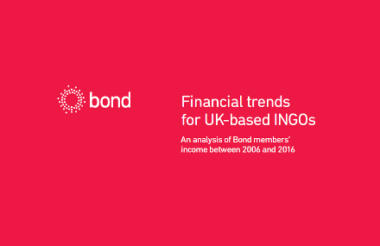The international development sector is growing six times as fast as the UK charity sector as a whole, and big aid charities are growing even faster, according to a report published today by Bond.
Bond published its Financial trends for UK-based INGOs report today, which showed that the total income for the international aid sector in the 2015/16 financial year was £3.891bn.
Drawn from the accounts of 305 of Bond’s member organisations, the report analyses the decade between 2006 and 2016. It found that Bond’s members overall income collectively grew by 59 per cent in that time, compared to just a 10 per cent growth in terms of the wider charity sector.
The report distinguishes between government contracts and government grants as distinct income streams, but put together government funding was the largest source of income for aid charities, worth more than £1.2bn.
Individual giving from the public represented the largest single source of income for aid charities, accounting for over £1.17bn or 31 per cent of the £3.8bn raised in 2015/16.
Graham MacKay, chief operating officer at Bond and the report’s author told Civil Society News that the data definitely shows however that the growth has not been evenly spread across the sector.
“The sector has grown about £1.3bn over the last 10 years and the vast majority of that has clearly gone to the larger organisations. The £20m-plus-a-year organisations.
"So there’s a clear relationship between the scale of an organisation, its ability to invest and ability to deliver results that these kinds of organisations have been able to demonstrate over the last decade, that the smaller ones maybe haven’t been able to.”
Large charities growing ‘disproportionately’ fast
The report showed that international development charities with annual turnovers in excess of £100m have been growing “disproportionately faster” than the rest of the aid sector. MacKay however doesn’t believe this is necessarily a problem for the sector as a whole.
“If you’re big then you have the resources to innovate and take risks, invest, build up strong skill sets in particular niche areas," he said. "Those are the sorts of things that, when you’ve got that large baseline of reserves and investment, that’s the sorts of things one can do. Smaller organisations just find it more difficult when everything is a bit more hand-to-mouth.
“There are some things that smaller organisations can do [to grow] but the important thing is that there’s a role for organisations of all sizes. We would never recommend growth for growth’s sake.
“One of the key arguments I’m trying to get across is about finding your niche, and delivering that niche well. That might be at scale, or it might be small. It might be a very select constituency, or specialised area. The point is in gearing it around what you do well.”
Safeguarding scandal affects ‘brand and identity’
While the data used for the report came from before this year’s safeguarding scandals, MacKay said he did anticipate them affecting the collective income of the international development sector in the future. He said that “brand and identity” are the most important things for a charity in the aid sphere.
“Brand and identity are incredibly important to any organisations. It’s how they project what they’re good at. I think it’s probably quite a banal point to say that a strong brand is a very precious asset for any organisation to have, but it connects them with the world around them and their support and income.
“It’s obviously not about the logo. It’s about adhering to the values that you want the organisation to be known for.”
The report can be read in full on Bond's website.
|









